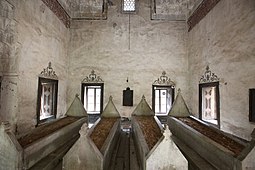Gülruh Hatun
| Gülruh Hatun | |||||
|---|---|---|---|---|---|
| Valide-i Hazret-ı Hatun-ı eyyam-ı muazzama | |||||

The tomb of "Gülruh Hatun" is located inside Gülruh Hatun Mausoleum Bursa
|
|||||
| Died | Bursa, Ottoman Empire | ||||
| Burial | Muradiye Complex, Bursa | ||||
| Spouse | Bayezid II | ||||
| Issue | Şehzade Alemşah Kamerşah Hatun |
||||
|
|||||
| House | House of Osman (by marriage) | ||||
| Religion | Sunni Islam | ||||
| Full name | |
|---|---|
| Gülruh Hatun Gulrukh Khatun گل رخ خاتون |
Gülruh Hatun (Ottoman Turkish: گل رخ خاتون; meaning "Rose Face") was the wife of Sultan Bayezid II.
Gülruh married Bayezid at Amasya. With Bayezid she had two children:
According to Turkish tradition, all princes were expected to work as provincial governors as a part of their training. In 1502 Alemşah was sent to Manisa and Gülruh accompanied him. She played an anxious role in protecting her son from manipulation by members of his princely entourage and to ensure that the sultan regarded the latter, and not the prince or herself, as responsible for the reports he had received about Alemşah's misconduct.
She responded to the sultan's instruction that she took to the conduct of her son. She presented her case against seven member's of her son's suite, including his tutor, his doctor, and his preceptor, to whom she attributed responsibility for the problems. It was Alemşah's tutor in particular whom she blamed. She accused the tutor and his colleagues of inducing Alemşah to drink excessively so that he might be persuaded to sanction proposals against the law of Islam and the law of the sultan.
Worried about Alemşah's health, she described his difficulty recovery from a month-long bout unable to bear any longer the corruption of these evil doers, Gülruh Hatun called the tutor shortcomings to the sultan's attention, among them the squandering of the prince's treasury to the extent that even she had not received her stipend for a year. But the tutor had dismissed her protest as the work of the chief eunuch of the prince's private household, and unjustly denounced the latter to the sultan. Gülruh Hatun implored the sultan to remove them. Gülruh Hatun concerned not only for the precariousness of her son's physical and political condition but also for the preservation of her own rights and status.
In retirement she occupied herself with pious works. Often she undertook the construction of her own or her son's tomb. Befitting her role as senior member of her son's household, she looked after members of the decreased prince's suite and assured that they were given appropriate new posts.
...
Wikipedia
